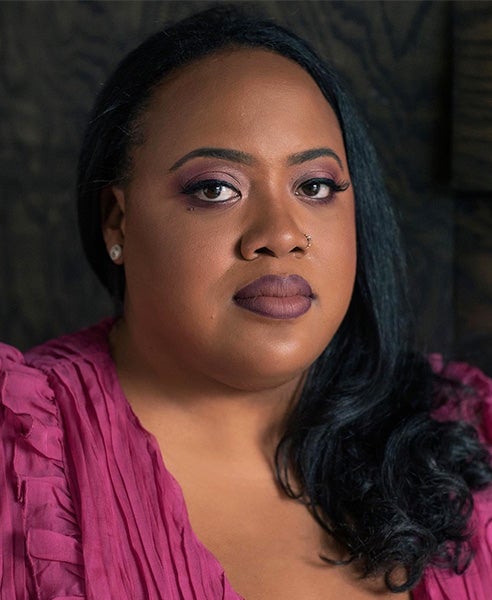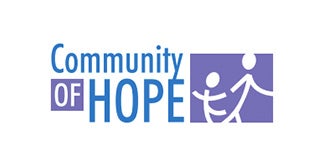School of Nursing Alum to Speak About Justice and Joy at Midwifery Anniversary Celebration
(September 22, 2023) — In celebrating 50 years of the nurse-midwifery program at Georgetown, the School of Nursing chose to honor one of their own, Ebony Marcelle (N’04), CNM, MS, FACNM, with the event’s keynote address. Marcelle, who has dedicated her career to confronting racism within health care systems, will focus on the role of midwives in addressing maternal health disparities in her remarks titled “Midwifery, Justice, and Joy.”

Ebony Marcelle (N’04), CNM, MS, FACNM
“Justice and joy can exist together,” said Marcelle. “We need to start thinking about how to have both while rebuilding our health care systems to confront racial disparities.”
A recent study from California, the state with the highest number of annual births, demonstrates what Marcelle says has been repeatedly shown: that Black women are more likely to die in childbirth than their white counterparts, regardless of education or income.
Marcelle believes that midwives, especially Black midwives, should serve a vital role in improving Black maternal health outcomes.
“Midwives come from a different space philosophically in the medical community,” she said. “We really think holistically about our patients, focusing on their families, their communities, and the systems that have caused them harm.”
Marcelle notes that Black maternal health disparities decrease with Black providers and that patients experience better birth outcomes across races when midwives are involved.
“Honestly, if Black women experience better birth outcomes, then maternity care for everyone will improve,” said Marcelle.
A Born Midwife
Deep down, Marcelle always knew she wanted to be a midwife.
“I grew up hearing stories about what we call ‘granny midwives,’ who were respected in the community as leaders, who caught generations of children, in addition to providing primary care to so many families,” she said. “I just think that kind of love and trust those midwives built with families and communities is priceless.”
Marcelle initially chose to pursue her education in developmental psychiatry in order to “be around babies and pregnant people.” But after receiving treatment herself from a midwife, it clicked that midwifery was the career for her.
“I must have driven the School of Nursing faculty crazy because I told them constantly that I was here to become a midwife,” said Marcelle. After graduating from Georgetown, Marcelle earned her master’s degree in midwifery from Philadelphia University, where she focused on African American infant mortality as her thesis topic.
“I remember being asked if I really wanted to write about such a big topic,” said Marcelle. “Most of my classmates were doing projects on water birth or labor positions, but I chose to focus on a really old problem that we still haven’t addressed.”
After completing her midwifery program, Marcelle made it her mission to practice social justice and work to be the change pregnant people and their families needed.
Doing the Work

Marcelle has been the director of midwifery at Community of Hope, a family birth center in Washington, DC, since 2015. The organization is dedicated to providing care to the uninsured and underinsured and ending family homelessness. She manages a staff of over 400 who served over 14,000 patients last year.
“At Community of Hope, we are very mission-driven to support families,” said Marcelle. “We are listening to them telling us what they need and meeting them where they are at, while not being judgmental.”
Part of the organization’s work is focused on growing the number of providers who are people of color. “One hundred percent of our full-time staff look like the patients we serve,” said Marcelle.
In addition to her day job, Marcelle also sits on numerous boards dedicated to addressing the Black maternal health crisis in the United States, including the National Association to Advance Black Birth and Black Mamas Matter Alliance.
She is also a board member with the American Association of Birth Centers in an effort to increase the number of Black women-led or -owned birth centers.
“Out of 400 or so birth centers in this country, only 15 are Black led or owned,” said Marcelle. “We need to build more pipelines for Black providers across the board.”
Marcelle’s tireless efforts were recognized by her profession in 2015 when she received the Kitty Ernst “Young Whippersnapper” Award from the American College of Nurse Midwives, an honor given to a midwife who had demonstrated innovative, creative endeavors in clinical practice, education, administration or research relating to midwifery and women’s health.
Past Mentors and Future Joy
The midwifery program at Georgetown first asked Marcelle to teach a course on racism in health care in 2013, a course she still teaches to student midwives a decade later.
“As a profession, I think we feel as though we are exempt from a lot of the challenges and harm being done in health care systems,” said Marcelle. “But there’s still privilege in our profession and perpetuating white supremacy culture that we need to deal with, and it’s important to think about that as midwifery students.”
Marcelle notes that Georgetown’s midwifery program has been aware and working toward addressing racism in maternal health care settings since her mentor, Marsha Jackson (G’81), CNM graduated.
“She attended midwifery school when none of her classmates looked like her, but then still went on to found BirthCare, one of the oldest surviving birth centers in the country, as a Black woman,” said Marcelle.
“We still have work to do to find justice, but I’m filled with so much joy thinking about this next generation of midwives who are calling out systems that are failing women and working to build better futures for us all,” said Marcelle.
Heather Wilpone-Welborn
GUMC Communications
Top Image: PeopleImages / iStock / Getty Images Plus

